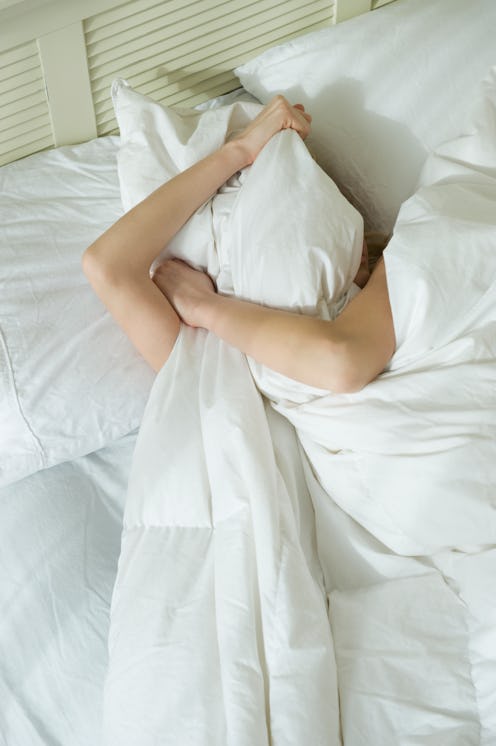Health
How To Deal With Hangover Anxiety Before It Happens
Part healthy habits, part boundary setting.

Plenty of people enjoy the opportunity to relax and unwind with a drink or a few while de-stressing and socializing with friends and family. We can all agree on one thing, though: no one likes a hangover and its telltale symptoms, which include excessive thirst, raging headaches, difficulty sleeping, or an unsettled stomach. Add the feeling of anxiety, or in this case, hangxiety, to the long list of physical ailments because of overindulging, and you can find yourself in a tough spot. Learning how to treat or prevent hangxiety can leave you a lot less apprehensive of your mornings-after.
What Is Hangxiety?
“Hangxiety” is a term used to describe the feelings of increasing anxiety the morning after drinking. It often comes hand in hand with the typical symptoms of a hangover, says Dr. Robert Cole, MD, an intensive care medicine specialist in Camden, New Jersey.
“When we drink alcohol, we stimulate receptors in the brain that cause happiness and calm, and this makes most people feel good and relax,” he explains. “When we go to sleep after a night of drinking, these biochemicals that were causing feelings of bliss and relaxation are suddenly gone, leading to a transient withdrawal that tends to make people feel anxious (withdrawal symptoms are always the opposite of the actual effects of the drug).”
Hangover-induced anxiety can also trigger a cycle of guilt and shame, which could lead to more drinking, adds Brittany A. Johnson, a licensed mental health counselor in New Albany, Indiana, and author of Get Out of Your Own Way: 21 Days to Stop Self Sabotage. It can also cause symptoms of anxiety to be heightened and more severe, which could lead to panic and other physical responses.
How Do You Treat Hangxiety?
According to Dr. Cole, exercise and physical activity is one of the most effective tactics for overall physical and mental well-being. Along with long-term positive health effects, exercise can cause an almost immediate reduction in anxiety and depressive symptoms linked to hangovers, he says.
“The caveat here is to remain well hydrated (mixing half Gatorade and half water will do the trick),” he says. “A severe hangover can make physical activity difficult and potentially dangerous, but if done safely, you have a real opportunity to treat those anxious feelings.”
Another tactic is to deal with feelings of guilt stemming from drinking, Dr. Cole says. Some people wake up feeling extra anxious after drinking in part because they may feel bad about what they said or did the night before. “By immediately addressing any feelings of guilt you can eliminate that component of your hanxiety,” he says. “For example, if you think you upset or offended someone, call or text them to clarify what happened and consider apologizing if appropriate. This will help ease your mind. Action is the best strategy to eliminate guilt, especially when it is proliferating anxiety.”
How To Prevent Hangxiety
“The best way to prevent hanxiety is to take a real look at your drinking patterns, and if you struggle to look at yourself objectively then have a friend or family member help you look at it,” Johnson says. “It’s also important to use healthy coping skills rather than alcohol when you are already feeling anxious or sad,” Dr. Cole says, pointing to relaxation techniques like yoga, meditation, spiritual practices, massage therapy, or listening to music.
Dealing with hangovers also isn’t just about how much you drink, but also what you take in, Dr. Cole says. Alcohol contains congeners, which are toxic byproducts that are produced when alcohol is metabolized. “Dark types of alcohol (bourbon, tequila,) seem to have higher amounts of congeners compared to clear drinks (vodka, gin)." By reducing these toxins, you can in turn reduce the severity of a hangover and thus reduce the occurrence of hangxiety. "Everyone is unique, so it is important to identify which types of alcohol increase your anxiety, keeping track of your symptoms and perhaps avoiding certain cocktails.”
Dr. Cole also recommends drinking and waking up with people you feel comfortable around, particularly if you’re shyer. “Surrounding yourself with people who you are comfortable with may lead to less anxiety, as you will go to bed and wake up in an environment in which you ... already feel secure in.”
Finally, it may seem obvious, but drinking less can help ward off this unpleasant side effect. “Set realistic limits on your drinking so you don’t have guilt from over indulging,” Johnson says.
“The less we flood our receptors with biochemicals that produce a strong feeling of relaxation, the less rebound feelings such as anxiety will occur,” Dr. Cole adds. “Pace yourself, drink water and be sure to eat.”
If you or someone you know is seeking help for substance use, call the SAMHSA National Helpline at 1-800-662-HELP(4357).
Experts:
Dr. Robert Cole, MD
Brittany A. Johnson, licensed mental health counselor